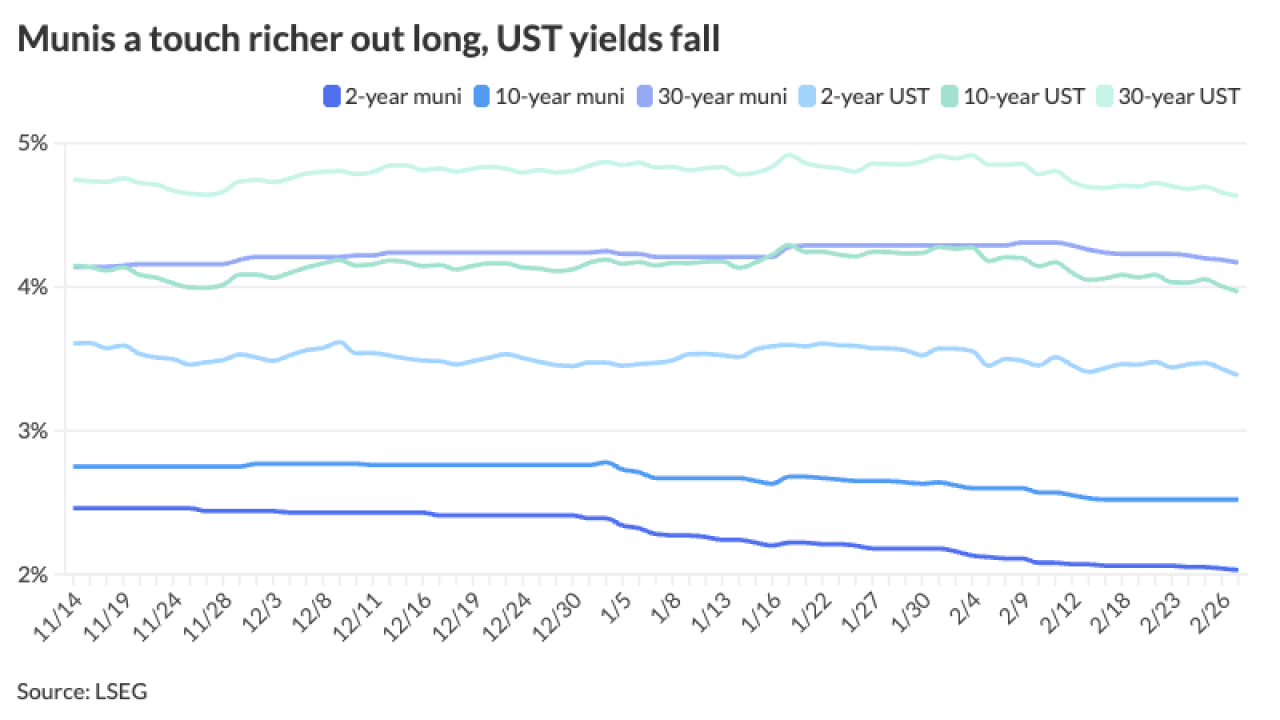Issuers in the Northeast sold $95.5 billion of municipal bonds in 2018, a 21.3% decrease from 2017, according to Refinitiv data.
The decline was in line with national trends that reflect the influence of the federal tax law overhaul that was adopted in late 2017. Among those trends was the 42% year-over-year drop in the fourth quarter, largely because of the overhang from the late 2017 surge when issuers rushed to market to beat the then-pending federal tax reform bill that ultimately axed tax-exempt advance refundings.

“You had a very heavy fourth quarter in 2017,” said Mark O. Norell, a public finance attorney partner at Ballard Spahr’s New York City office. “There was a real concern that became a reality with the loss of advanced refundings.”
The Northeast region encompasses 11 states from Maine to Maryland along with the District of Columbia, Puerto Rico and the Virgin Islands.
The top five sources of 2018 bond issuance in the Northeast were New York with $41.7 billion, Pennsylvania with $13.3 billion, New Jersey with $11.3 billion, Massachusetts with $8.1 billion and Connecticut with $6.4 billion. Connecticut was the only one of the top five states to see an issuance increase with volume jumping 2.6%.
The decline in Northeast issuance was similar to other regions across the country. The Midwest had the largest drop of 28.1% followed by 27.7% in the Far West, 22.6% in the Southeast, 21.3% in the Northeast and 20.2% in the Southwest. Overall municipal bond sales were down 24% nationally from 2017.
Norell noted that in addition to the loss of advanced refundings last year and accounting for higher than normal volume in late 2017, issuance may have also slowed because of economic uncertainty. He said doubts about whether the Trump administration will approve an infrastructure spending bill also have resulted in state and local governments being reluctant to borrow.
“There continues to be uncertainty about infrastructure plans and that may cause people to pause a bit,” said Norell.
Pennsylvania experienced the largest issuance drop of the big volume states with bond sales declining 38.5% year-over-year. Refunding deals in the Keystone State fell 75% with only 58 transactions accounting for $2.4 billion last year compared with 198 sales and $9.6 billion in 2017. The state also saw large drop-offs in healthcare borrowing, which was down 62%, and education, which was 30% lower in volume with 102 fewer deals than 2017.
“Combining the year-end issuance push in 2017 and inability to advance refund debt 2018, are the drivers for the precipitous drop in refunding volume in 2018 relative to new money or other purposes,” said Janney Capital Markets analyst Erin Ortiz. “Absent the reinstatement of advance refundings, the lack of flexibility will continue to curb issuance volume as there did not appear to be a swift move to taxable debt or other creative financings.”
Ortiz added that Pennsylvania had “very strong” bond volume from 2015 to 2017 compared to previous years stemming largely from the post-recession recovery period and large issuers having sizable capital programs to fund. The state’s average issuance from 2009 to 2018 was around $12.5 billion, according to Ortiz.
New Jersey volume slipped only 7.6% from 2017 aided largely by a $3.1 billion New Jersey Tobacco Settlement Financing Corp. deal priced by Jefferies Group that was the region’s largest individual bond transaction in 2018. The New Jersey Transportation Trust Fund Authority also came to market with deals of $1.2 billion in July and $1.6billion in October.
Anthony Inverso, senior managing director of Bordentown, New Jersey-based Phoenix Advisors, noted that while total volume in the state was not far off from 2017, the number of deals fell sharply to 191 from 286 due largely to advanced refundings being off the table. He said the advanced refundings loss led to a big drop in higher education borrowing with the New Jersey Educational Facilities Authority issuing no debt last year after selling $1.2 billion of bonds in 2017.
“There was some higher education deals in 2017 that came in sooner than they otherwise would have because of the tax bill,” said Inverso. “It also could be a matter of slowing down after taking on many projects the last few years.”
Inverso said a change in governors with Gov. Phil Murphy assuming office in January also likely played a role in less borrowing at the state level since many deals take months to materialize and it takes time for an administration to craft priorities. He added that local governments also scaled back bond issuance last year as a result of a rising interest rate environment.

“Many projects are interest-rate driven and they weren’t terrible last year, but they were creeping up,” Inverso said. “That impacted some issuers.”
Municipal bond volume from New York state fell 14.6% from 2017 including 31.4% in the fourth quarter. The state was credited by Refinitiv with seven of the region’s largest 10 transactions including four borrowings from the Dormitory Authority of the State of New York, which was the nation’s largest issuer at $9.1 billion. The New York City Transitional Finance Authority was the region’s second biggest issuer at $7.7 billion.
Connecticut’s slight issuance jump was fueled by the state government selling $3.6 billion through 20 transactions including an $889 million general obligation bond sale on Aug. 16. The Connecticut Housing Finance Authority was also active with $733.6 million of borrowing through 22 issues.
Bank of America Merrill Lynch was again the Northeast’s top senior manager, credited by Refinitiv with a par volume of $18.76 billion. Citi moved to second from third with $14.5 billion followed by Jefferies LLC, which rose from eighth place. Morgan Stanley held firm in the fourth spot while JPMorgan Chase placed fifth, a drop of three spots from 2017.
Norton Rose Fulbright took over as the region’s top bond counsel firm, credited with more than $10.4 billion on 62 transactions. Hawkins Delafield & Wood moved down to second place while Orrick Herrington placed third for the second straight year. Ballard Spahr and Chiesa Shahinian rounded out the top five.
Public Resources Advisory Group retained its hold in the Northeast financial advisor rankings, credited with more than $20.5 billion of business on 96 transactions. PFM was credited with $17.9 billion on 229 deals. Acacia Financial placed third. Frasca & Associates moved up to fourth after not placing in the top 10 in 2017 while Hilltop Securities remained in fifth place.





